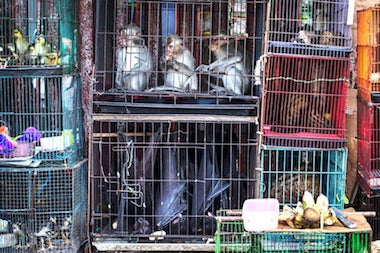The World Wildlife Trade is bad for our health (and that of our planet)
The pandemic has caused all of us to reexamine our relationship with the animal kingdom. Nature has certainly gotten our attention, and in the process has exposed the suffering of millions of wild animals. We use them as food and medicine, killing them in inhumane ways, usually after confining them in deplorable conditions. Or we deprive them of their lives in the wild and use them as entertainment, or take them as pets. In these latter cases they are transported all over the globe, with millions not surviving the journey. If you’ve ever purchased a parrot from a pet store, were you aware that the majority of them die in transit before ever reaching that store? Or that the African Grey Parrot, one of the smartest animals alive, is rapidly being driven to extinction because of the pet trade? And this is true of countless “exotic” species which are in high demand.
We’ve unhesitatingly maintained our position as masters over the rest of the animal kingdom, as a matter of right, for thousands of years.
Now, however, our reach is global, and its impact pervasive. Our actions have always come with consequences for others, but this time our indifference to the suffering of other species has been especially costly to humans. We’ve been bitten, and we need to start listening.
With COVID-19 sweeping across the globe, we have to finally recognize the danger of ignoring our of exploitation of wild animals.
Ending, or at least significantly curtailing, the global wildlife trade would provide not only exciting wins in our treatment of wild animals, it would help protect our health, and that of the planet, too. We can build a more sustainable future by ensuring that animal welfare is top of mind for sectors such as the travel industry, animal tourism, farming and the pet trade.
We’ve callously engaged in a global multi-billion-dollar trade in which other species are poached, farmed and sold, often having to endure horrific conditions and unimaginable suffering for the individuals involved. This also creates opportunities for the spread of zoonotic disease, leading to outbreaks like SARS and now COVID-19. If we were indifferent to the knowledge before, we can no longer be – the pain we so casually inflict on animals carries a price we ourselves must pay.
Putting a stop to the international trade in wild animals now will help prevent the next global health crisis, as well as to protect our environment for the next generation to come. We need to engage our governments to partner with industry and to do everything in our power to prevent the next pandemic from ever happening. Action to curb the global wildlife trade is one of the most effective strategies to prevent future pandemics, to reduce animal suffering, and to protect biodiversity.
We support efforts by organizations like World Animal Protection, calling on Canada to champion a ban on wildlife markets – to halt the international trade in wild animals and all of the products we make from them. This also appears to be a popular position, with 68% of Canadians being in favour of governments around the world implementing such a ban. We’re still dealing with the pandemic, and will be for a while yet, and a key part of our coordinated global response needs to be that we act to end this trade which imposes so much suffering, and in the process serve to protect our own health.
For The Orca’s Voice,
Dani, Canadian Cetacean Alliance



Leave a Reply